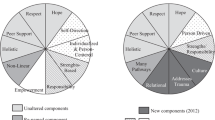Abstract
An emerging focus of Assertive Community Treatment (ACT) teams is the transition of clients to less intensive services, which creates space for individuals in need of ACT and is consistent with a recovery orientation of treatment. However, there is limited research on team transition rates, post-ACT services, and strategies to overcome transition barriers. In addition, few studies have examined differences in these factors among urban and rural ACT teams. To address these knowledge gaps, we interviewed eight ACT teams in urban and rural areas of eastern Ontario regarding their transition rates, processes of transitioning ACT clients to less intensive services, transition barriers, and solutions to overcoming these barriers. On average, teams transitioned about 6% of their clients over our 3-year study period. Urban and rural teams described both similar and distinct clinical and systemic barriers, such as client reluctance to transition and finding psychiatric follow-up outside of ACT. Implications for ACT practice and policy are discussed.
Similar content being viewed by others
References
Anthony, W. A. (1993). Recovery from mental illness: The guiding vision of the mental health service system in the 1990s. Psychosocial Rehabilitation Journal, 16(4), 11–23.
Audini, B., Marks, I. M., Lawrence, R. E., Connolly, J., & Watts, V. (1994). Home-based versus out-patient/in-patient care for people with serious mental illness: Phase II of a controlled study. The British Journal of Psychiatry, 165(2), 204–210.
Bond, G. R., Drake, R. E., Mueser, K. T., & Latimer, E. (2001). Assertive Community Treatment for people with severe mental illness: Critical ingredients and impact on patients. Disease Management and Health Outcomes, 9(3), 141–159.
Bromley, E., Mikesell, L., Armstrong, N. P., & Young, A. S. (2015). “You might lose him through the cracks”: Clinicians’ views on discharge from Assertive Community Treatment. Administration and Policy in Mental Health and Mental Health Services Research, 42(1), 99–110.
Chen, F., & Herman, D. B. (2012). Discharge practices in a time-unlimited intervention: The perspectives of practitioners in Assertive Community Treatment. Administration and Policy in Mental Health and Mental Health Services Research, 39(3), 170–179.
Cuddeback, G. S., Morrissey, J. P., & Meyer, P. S. (2006). How many Assertive Community Treatment teams do we need? Psychiatric Services, 57(12), 1803–1806.
Cuddeback, G. S., Shattell, M. M., Bartlett, R., Yoselle, J., & Brown, D. (2013). Consumers’ perceptions of transitions from Assertive Community Treatment to less intensive services. Journal of Psychosocial Nursing and Mental Health Services, 51(8), 39–45.
Davidson, L. (2003). Living outside mental illness: Qualitative studies of recovery in schizophrenia. New York, NY: New York University Press.
Donahue, S. A., Manuel, J. I., Herman, D. B., Fraser, L. H., Chen, H., & Essock, S. M. (2012). Development and use of a transition readiness scale to help manage ACT team capacity. Psychiatric Services, 63(3), 223–229.
Finnerty, M. T., Manuel, J. I., Tochterman, A. Z., Stellato, C., Fraser, L. H., Reber, C. A. S., & Miracle, A. D. (2015). Clinicians’ perceptions of challenges and strategies of transition from Assertive Community Treatment to less intensive services. Community Mental Health Journal, 51(1), 85–95.
Hackman, A. L., & Stowell, K. R. (2009). Transitioning clients from Assertive Community Treatment to traditional mental health services. Community Mental Health Journal, 45(1), 1–5.
Haggerty, J., Roberge, D., Freeman, G. K., & Beaulieu, C. (2013). Experienced continuity of care when patients see multiple providers: A qualitative metasummary. Annals of Family Medicine, 11(3), 262–271.
McRae, J., Higgins, M., Lycan, C., & Sherman, W. (1990). What happens to patients after five years of intensive case management stops? Hospital and Community Psychiatry, 41(2), 175–179.
Ministry of Health and Long-Term Care. (2005). Ontario program standards for ACT teams, 2nd edition. Ontario ACT Association. Retrieved from http://ontarioacttassociation.com/on-act-standards/.
Morse, G., Glass, A. M. H., & Monroe-DeVita, M. (2016). ACT and recovery: What we know about their compatibility. Administration and Policy in Mental Health and Mental Health Services Research, 43(2), 219–230.
Nugter, M. A., Engelsbel, F., Bähler, M., Keet, R., & van Veldhuizen, R. (2016). Outcomes of flexible Assertive Community Treatment (FACT) implementation: A prospective real life study. Community Mental Health Journal, 52(8), 898–907.
Rosenheck, R. A., & Dennis, D. (2001). Time-limited assertive community treatment for homeless persons with severe mental illness. Archives of General Psychiatry, 58(11), 1073–1080.
Rosenheck, R. A., Neale, M. S., & Mohamed, S. (2010). Transition to low intensity case management in a VA Assertive Community Treatment model program. Psychiatric Rehabilitation Journal, 33(4), 288–296.
Salyers, M. P., Masterton, T. W., Fekete, D. M., Picone, J. J., & Bond, G. R. (1998). Transferring clients from intensive case management: Impact on client functioning. American Journal of Orthopsychiatry, 68(2), 233–245.
Salyers, M. P., & Tsemberis, S. (2007). ACT and recovery: Integrating evidence-based practice and recovery orientation on Assertive Community Treatment teams. Community Mental Health Journal, 43(6), 619–641.
Sherman, P. S., & Ryan, C. S. (1998). Intensity and duration of intensive case management services. Psychiatric Services (Washington, D.C.), 49(12), 1585–1589.
Statistics Canada (2017). 2016 Census. Retrieved from http://www12.statcan.gc.ca/census-recensement/2016/dp-pd/prof/index.cfm?Lang=E.
Stein, L. I., & Test, M. A. (1980). Alternative to mental hospital treatment. I. Conceptual model, treatment program, and clinical evaluation. Archives of General Psychiatry, 37(4), 392–397.
Acknowledgements
The Community Mental Health Program of The Royal would like to thank all Champlain LHIN ACT team members, managers, and directors who provided information for this study; they have been essential in sharing information to learn about client transition practices. Thank you to Robin Pow, Director of the Community Mental Health Program of The Royal and Chair of the Eastern Ontario ACTT Network, for facilitating the conduction of this study.
Author information
Authors and Affiliations
Corresponding author
Rights and permissions
About this article
Cite this article
LeFebvre, A.M., Dare, B., Farrell, S.J. et al. Transitions from Assertive Community Treatment Among Urban and Rural Teams: Identifying Barriers, Service Options, and Strategies. Community Ment Health J 54, 469–479 (2018). https://doi.org/10.1007/s10597-017-0162-3
Received:
Accepted:
Published:
Issue Date:
DOI: https://doi.org/10.1007/s10597-017-0162-3




